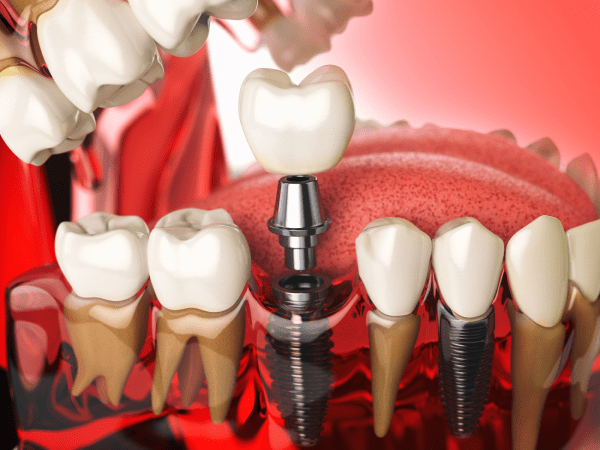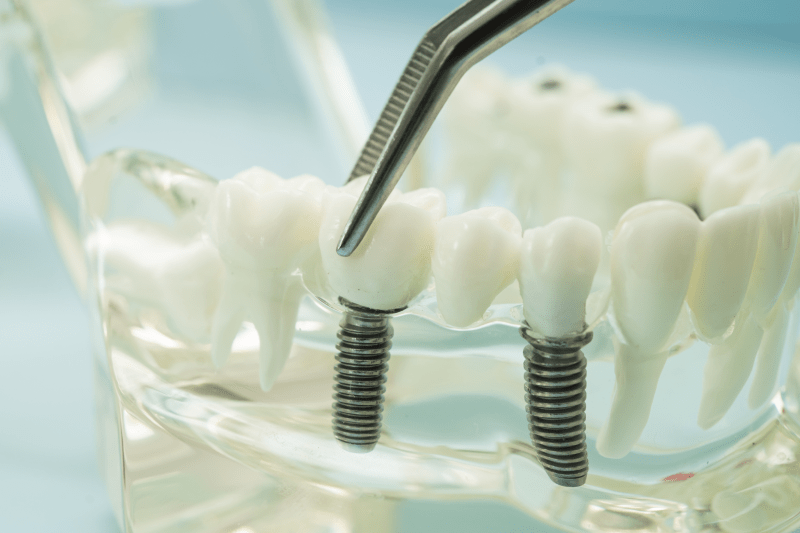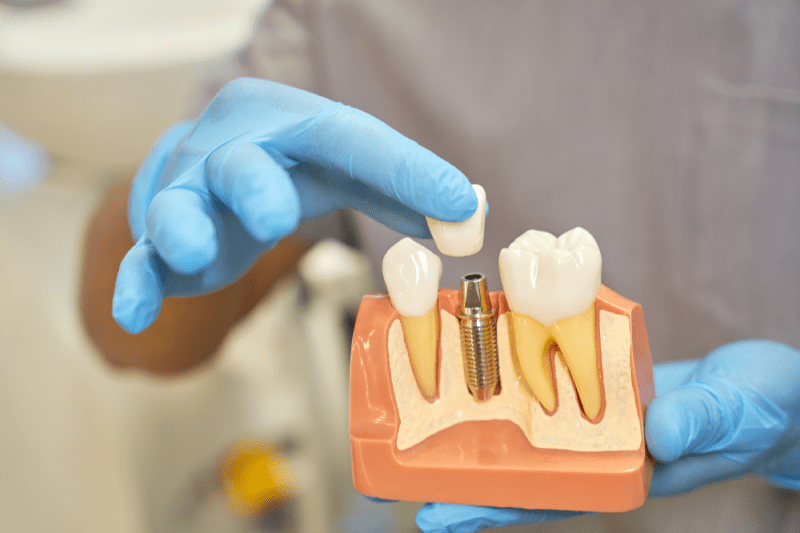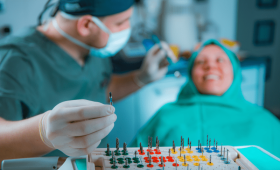The favored holiday destination of the Aegean Region, Cesme, has become a shining star of health tourism not only with its magnificent bays and historical texture but also with the international standard dental implant solutions it offers. For those seeking access to high-quality implant treatment at costs far below those in Western Europe and America, Cesme provides an ideal destination combining a luxury holiday with permanent smile restoration. Modern clinics utilize expert dental staff and the latest digital technology to ensure the most comfortable and reliable treatment process for their patients.
So, what is the price situation for single tooth or full arch implants in Cesme? What are all the stages of implant treatment, and how can you turn this crucial health journey into a stress-free experience with the assurance of Cure Holiday? In this comprehensive guide, you will find detailed information under more than 40 subheadings, with each answer provided in at least 65 words.
What Exactly Is Implant Treatment?
Implant treatment involves the surgical placement of artificial tooth roots made of titanium into the jawbone, aiming to permanently restore the function and aesthetics of missing teeth. These titanium screws are produced from biocompatible materials that exhibit excellent harmony with the human body and readily fuse with the bone (osseointegration). After the implant achieves complete integration with the jawbone, a crown (prosthetic tooth) made of porcelain or zirconium is mounted onto it, offering a fixed solution that perfectly mimics both the appearance and the chewing function of a natural tooth. This method represents a much more natural and comfortable alternative compared to traditional bridges or removable dentures.

What Are the Most Important Advantages of Dental Implant Treatment?
The most important advantage of dental implant treatment is providing the patient with a permanent and fixed solution, ensuring the recovery of chewing function to a level close to that of original teeth. It completely eliminates the slipping, movement, and speech difficulties caused by removable dentures. Furthermore, implants stimulate the jawbone, halting or slowing down the inevitable bone loss (resorption) process that occurs after tooth loss, which prevents the collapse of the facial line and an aged appearance. Since implants complete the missing tooth without needing to touch adjacent healthy teeth, they also allow for the preservation of the natural structure of other teeth.
How Long Does Single Tooth Implant Treatment Take on Average?
The total duration of single tooth implant treatment, including surgical and healing phases, generally spans a period of 3 to 6 months, although this varies from patient to patient. The first stage, the surgical placement of the implant into the jawbone, is completed under local anesthesia and in a very short time (approximately 30-60 minutes). Following this surgery, an osseointegration period of 3 to 6 months is awaited for the implant to fuse with the bone. At the end of this waiting period, the permanent crown is placed onto the implant in a second clinical phase that only takes a few days, completing the treatment.
Is Severe Pain Felt After Implant Placement?
Implant surgery, thanks to modern anesthesia techniques and minimally invasive surgical methods, is designed so the patient does not feel any pain during the procedure. The operation is usually performed under local anesthesia, with the patient conscious and comfortable. Post-surgery, the expected mild swelling and minimal pain are easily controlled with strong painkillers prescribed by the doctor and cold application (ice packs). Most patients report being able to quickly return to their daily routines after the first 24-48 hours, stating that the pain is mild and manageable, not severe.
Who Is a Suitable Candidate for Dental Implant Treatment?
A suitable candidate for dental implant treatment is primarily an individual whose general health condition is suitable for surgical operation and who has sufficient density and volume in the jawbone to support the implant. Chronic conditions such as diabetes or heart disease must be under control in these patients. Additionally, the patient’s commitment to meticulous oral hygiene after treatment is of paramount importance for the long-term longevity of the implants. Even patients with insufficient jawbone volume can be made suitable candidates through additional procedures such as bone grafting or sinus lifting.
What Is the Importance of Implant Brands Used in Implant Treatment?
The quality and reliability of the implant brand used are vital for the success and long-term lifespan of the implant treatment. High-quality and internationally recognized brands (such as Swiss or German brands) generally offer clinically proven standards regarding the purity of the titanium, surface structure, and success rate of bone fusion (osseointegration). These brands often provide a lifetime warranty for the implant itself, securing the patient’s investment. High-standard clinics in Cesme prefer internationally valid, CE and FDA-approved implant brands to maintain the highest level of treatment quality.
What Is Done If the Jawbone Is Insufficient for Implant Treatment?
In situations where the volume or density of the jawbone is insufficient for implant placement, surgical bone augmentation procedures (bone grafting) are performed before commencing treatment. Bone grafting is the process of adding volume to the jawbone using bone harvested from the patient’s own body, synthetic bone materials, or special animal-derived bone substitutes. In the upper jaw, if the sinus cavity interferes with the area where the implant will be placed, a sinus lifting procedure is performed. These additional procedures guarantee that the implants have a solid foundation, ensuring the long-term success of the treatment.
What Are the Implant-Supported Crown (Prosthetic Tooth) Options?
Implant-supported crowns are the visible part mounted onto the implant, restoring the aesthetics and function of the lost tooth, and are generally made from one of three main materials. The most commonly used option, offering the most aesthetic results, is metal-free zirconium crowns. Zirconium mimics the light translucency of natural teeth and provides excellent aesthetics, especially for anterior teeth. Alternatively, in some cases, full ceramic (E-Max) or metal-supported porcelain crowns, which are a more economical option, may also be preferred. The choice of material is determined based on the patient’s aesthetic expectations and the implant’s location.
What Is the Lifespan and Long-Term Use of Implants?
Dental implants, since they are produced from high-quality materials and biologically fuse with the jawbone, have the potential to be used for a lifetime, provided the patient is diligent about oral hygiene and regular medical check-ups. Scientific studies show that the success rate of implants remaining in the mouth for over ten years is above 95%. However, the crown (prosthetic tooth) placed on the implant may need replacement approximately every 10-15 years due to chewing forces. The long life of the implant is largely dependent on the patient’s regular brushing, flossing, and professional cleaning routines.
How Does Smoking Negatively Affect Implant Success?
Smoking is one of the most important risk factors that directly and seriously negatively affect the success rate and long-term lifespan of dental implant treatment. Nicotine and other chemicals in cigarettes reduce blood flow to the surgical area, weakening osseointegration, the process of the implant fusing with the jawbone. Furthermore, smoking slows down wound healing, increases the risk of infection, and accelerates the progression of gum diseases. For these reasons, doctors strongly advise completely quitting smoking before starting implant treatment or, at the very least, strictly refraining from it during the critical healing period before and after surgery.
What Are All-on-4 and All-on-6 Full Arch Implant Solutions?
Full arch implant solutions are innovative techniques developed to provide fixed prostheses for patients who have lost all their teeth or are about to lose them. All-on-4 fixes all teeth in one arch onto only four implants, while the All-on-6 system uses six implants to offer greater stability and durability. Unlike traditional implant applications, both methods can generally be applied without the need for bone grafting and allow the patient to receive temporary fixed teeth within 24-48 hours after surgery. These solutions rapidly restore the patient’s chewing power and aesthetic appearance.
What Preparations Should Be Made Before Implant Treatment?
A detailed preparation process is implemented before implant treatment to ensure the patient’s general health status is suitable for surgery. This process includes the doctor obtaining blood tests and a detailed medical history from the patient. 3D Tomography (CBCT) imaging is performed to precisely analyze the jawbone condition. If there are untreated cavities or active gum inflammation in the mouth, it is mandatory to fully resolve these issues before implant placement. The doctor gives specific instructions to the patient regarding antibiotics and painkillers that should be started before the operation.

Should Local Anesthesia or Sedation Be Preferred During Implant Treatment?
For patient comfort during implant treatment, local anesthesia is applied as standard, and since the surgical area is completely numb, the patient feels no pain. However, sedation (a state of conscious twilight sleep) may be preferred, especially in long or extensive surgical procedures (such as multiple implants or bone grafting) or if the patient experiences high anxiety and fear. Sedation allows the patient to undergo the operation comfortably and stress-free and prevents them from recalling the procedure. Modern clinics in Cesme offer safe sedation options accompanied by an anesthetist, based on the patient’s comfort preferences.
What Does the Process of Implant Fusing with Bone (Osseointegration) Mean?
Osseointegration is the name given to the process by which the dental implant (titanium root) establishes a direct, structural, and functional bond with the jawbone, and it is the key to the success of implant treatment. This process begins immediately after the implant is surgically placed and refers to the time required (usually 3 to 6 months) for the implant to serve as a durable, fixed tooth root. During this time, the implant integrates with bone cells to form a permanent foundation. The completion of this process is essential for the safe placement of the permanent prosthesis before any load is applied to the implant.
What Are the Main Advantages of Receiving Dental Implant Treatment in Cesme?
The main advantages of receiving dental implant treatment in Cesme are the combination of international quality treatment with a luxury holiday experience and significant cost savings. Clinics in the region use the same premium implant brands and digital technologies as clinics in Europe and America, while prices are 50% to 70% lower due to the exchange rate advantage. Furthermore, the calm, peaceful, and touristic atmosphere of Cesme allows patients to spend their post-treatment recovery period relaxing, away from stress and anxiety.
What Is the Starting Price for Single Tooth Implants in Cesme?
Single tooth implant prices in Cesme generally parallel the averages for Izmir and the Aegean Region, but the price can vary widely depending on factors such as the implant brand used, the expertise level of the doctor, and the clinic’s location. Prices usually start lower for local brands, while they fall within a higher range when premium brands of Swiss or German origin are used. This cost typically includes the surgical implant placement fee, the abutment (connector piece), and the cost of the zirconium or porcelain crown. The most up-to-date and precise pricing is provided transparently by Cure Holiday after the patient’s detailed preliminary examination.
Which Implant Brands Do Cesme Clinics Prefer?
High-standard clinics serving health tourism in Cesme prefer internationally accepted and proven reliable implant brands. These brands often include established premium or high-end international brands such as Straumann, Nobel Biocare (Switzerland), Osstem, Megagen (South Korea), and Bego (Germany). The main reason for preferring these brands is their long history of clinical success, high osseointegration rates, and the lifetime product warranty they offer for the implant itself. Clinics offer a wide range of brands to select the most suitable one for the patient’s budget and bone structure.
What Digital Technologies Are Used in Cesme Clinics?
Modern dental clinics in Cesme actively use the latest digital technologies to maximize the safety and precision of implant treatment. Chief among these technologies is Cone-Beam Computed Tomography (CBCT), which provides a detailed three-dimensional (3D) image of the jawbone. Treatment planning is integrated with Digital Smile Design (DSD) software using these 3D images. In the surgical phase, Surgical Guides are used to ensure the implants are placed with millimetric precision in the pre-planned position. This digital workflow makes the treatment process faster, less invasive, and more predictable.
How Are Transportation to Cesme and Clinic Transfers Provided?
International patient travel to Cesme is quite comfortable via Izmir Adnan Menderes Airport (ADB). The airport is approximately one hour away from Cesme. Cure Holiday includes VIP transfer service in all treatment packages to maximize patient comfort. Under this service, patients are met at the airport and safely transported in luxury, private vehicles to their accommodation in Cesme and to all clinic appointments on time. This uninterrupted logistical support ensures the patient focuses on treatment and avoids travel stress.
How Long Is the Necessary Stay in Cesme for Implant Treatment?
The duration of stay in Cesme for single tooth implant or All-on-X full arch implant treatment varies according to the treatment stage. For the implant placement stage (first visit), the patient needs to stay in Cesme for an average of 3 to 5 days. This period covers the examination, surgery, and placement of temporary teeth. For the second stage, the placement of permanent prostheses (after 3-6 months), the patient needs to stay for about 5 to 7 more days. Cure Holiday meticulously organizes the most suitable appointment and accommodation durations for the patient’s travel plan.
What Accommodation Options Are Offered in Cesme During Implant Treatment?
Cesme offers various luxury accommodation options that allow patients to rest and undergo a comfortable recovery process during implant treatment. These options include boutique hotels in peaceful Alacati, high-standard apartments in Ilica, or private hotels close to the clinic. Cure Holiday carefully selects the accommodation units included in its packages to be quiet, comfortable, and optimally suited for the patient’s resting needs. This allows patients to turn their treatment process into a health holiday in the relaxing atmosphere of the Aegean.
What Is the Expertise Level of Cesme Dentists in Implantology?
Dentists working in health tourism-focused clinics in Cesme generally possess high specialization and international experience in the fields of oral implantology, maxillofacial surgery, and prosthetic dentistry. Many are experts who have received training from prestigious universities at home and abroad and have achieved high success rates in complex implant cases (All-on-4/6, bone grafting). Cure Holiday’s collaborating doctors apply the latest surgical techniques and digital planning protocols, guaranteeing patients receive the most reliable and aesthetic results.
How Should Nutrition Be Managed Before and After Implant Treatment?
Before implant treatment, a balanced and vitamin-rich diet is recommended to support wound healing. Post-surgery, utmost care must be taken with nutrition during the first 3 months to avoid jeopardizing the implant’s complete fusion with the bone. Patients should consume only liquid or pureed foods in the first few days, then continue with soft foods, avoiding hard and sticky items. Even after the implants have fully fused, avoiding biting excessively hard foods with the front teeth is important for long-term longevity.
What Additional Expenses May Arise in Addition to Implant Prices?
Implant prices in Cesme generally cover the surgical procedure and the cost of the implant/crown, but some additional procedures may not be included in the price. The most common of these additional expenses are bone grafting (cost of bone powder or membrane) when mandatory before implant placement, sinus lifting operation, and the extraction of old, problematic teeth. When obtaining a price quote, it is important to clearly determine the cost of these potential additional surgical procedures and confirm whether they are included in the package offer through Cure Holiday for transparency.

What Is the First Step to Start Implant Treatment with Cure Holiday?
The first step to starting the implant treatment journey with Cure Holiday in Cesme is to request a free preliminary consultation via Cure Holiday’s website or communication channels. In this initial contact, the patient’s current panoramic X-ray images and medical history are requested. Expert implantologists in Cesme meticulously analyze this data to determine the patient’s bone status, suitability for treatment, and the required number of implants. Following this preliminary assessment, a personalized, transparent, and all-inclusive treatment plan and cost quote are presented to the patient.
What Is Included in the Scope of Cure Holiday Implant Packages?
Cure Holiday’s implant treatment packages for Cesme are comprehensive solutions designed to cover all services international patients may need. These packages typically include: the cost of the premium implants used, all surgical procedure fees, the cost of both temporary and permanent zirconium/porcelain crowns, luxury accommodation fees for the stipulated duration, all VIP transfers between Izmir Airport-Hotel-Clinic, necessary post-operative medications, and 24/7 personal interpreting/guidance services.
What Quality and Assurance Standards Does Cure Holiday Guarantee?
Cure Holiday is committed to international quality assurance in implant treatments in Cesme. It collaborates only with clinics that have international accreditations like ISO and CE and are equipped with the latest digital technology, and specialists in implantology. The company guarantees that all implant and prosthetic materials used are original, certified, and covered by the manufacturer’s warranty. Furthermore, it operates continuous monitoring and follow-up mechanisms to ensure the highest standards are applied at every stage of the patient’s treatment process (surgical precision, hygiene, aesthetic results).
How Is the Language Barrier Overcome During Implant Treatment?
Since correct communication is vital in complex treatments like implant surgery, Cure Holiday provides professional support to overcome the language barrier. Personal consultants who speak the patient’s native language are involved from the first communication onward. Experienced, professional interpreters accompany the patient during clinic visits, surgical operations, and doctor consultations. This uninterrupted interpreting service ensures the patient fully understands the treatment plan, clearly asks all their questions, and feels secure.
How Is Financial Transparency and No Hidden Cost Guarantee Ensured with Cure Holiday?
Cure Holiday guarantees absolute financial transparency in high-cost treatments like implants. The all-inclusive price quote presented to the patient is a legally binding contract that lists all cost items (implant, crown, laboratory, accommodation, transfer) in detail. This transparency means the patient will definitely not encounter any surprise or hidden additional costs during their treatment stay in Cesme. Payment terms and warranty details are also clearly stated in the contract.
How Does the Long-Term Follow-up and Control Mechanism Work After Treatment?
Long-term follow-up is critical for ensuring the implants’ lifelong durability after treatment. Cure Holiday implements a systematic follow-up mechanism that continues even after the patient returns to their home country. Remote video or written control sessions are organized at intervals determined by the surgeon (e.g., at 3, 6, and 12 months). These checks evaluate the status of the implants, gum health, and the fit of the prostheses. The Cure Holiday team collaborates with the patient’s local dentist, sharing necessary medical reports and care instructions.
How Does Cesme’s Tranquility Contribute to the Recovery Process?
Cesme’s peaceful and calm atmosphere, away from the hustle of big cities, significantly contributes to both the physical and psychological recovery process after dental implant surgery. The low stress level supports hormonal balance, which accelerates wound healing. The clean Aegean air, mild climate, and relaxing sea view help patients recover mentally faster. This natural and calm environment turns the treatment process from a necessity into a relaxing health holiday.
What Is the Role and Importance of Temporary Prostheses in Implant Treatment?
Temporary prostheses are fixed teeth screwed onto the implants immediately after implant surgery (often within 24-48 hours), preventing the patient from being toothless. The role of these prostheses is not only to rapidly restore aesthetic appearance but also to allow the implants to fuse healthily with the bone by distributing the load on them controlledly during the healing process. Temporaries enable the patient to immediately return to their social life and serve as an important stage guiding the design of the permanent prostheses.
Why Is Quitting Smoking Mandatory Before Implant Treatment?
Quitting smoking before and after implant treatment is one of the most critical medical requirements stipulated for the absolute success of the treatment. Nicotine and other chemicals in cigarettes severely restrict blood vessels, impeding blood and oxygen flow to the implant site. This situation disrupts the osseointegration process (the implant bonding with the bone) and exponentially increases the risk of infection. Doctors generally request that patients completely quit smoking at least two weeks before surgery and absolutely refrain from it until healing is complete.
Is Esthetics or Function Prioritized When Choosing the Implant-Supported Crown?
In choosing the implant-supported crown, both aesthetic and functional expectations are equally prioritized; modern dentistry aims to achieve both without compromising one for the other. Zirconium, which is highly durable, is preferred for posterior teeth where chewing forces are paramount, while aesthetic concerns are prominent for anterior teeth due to the need to mimic natural light translucency and color, leading to the frequent selection of zirconium or full ceramic (E-Max). Expert doctors guarantee personalized crown designs that optimally combine both elements through digital planning.
What Is the Extra Added Value of Receiving Implant Treatment with Cure Holiday?
The extra added value of receiving implant treatment with Cure Holiday in Cesme is transforming a complex surgical process into a luxurious, personalized, and fully organized health journey. Cure Holiday’s management of all details—not just the medical process but also logistics, accommodation, and communication—provides great relief to the patient. This ensures the patient is guaranteed the highest quality implant brands, the most experienced doctors, and an environment focused solely on their recovery and new smile.


